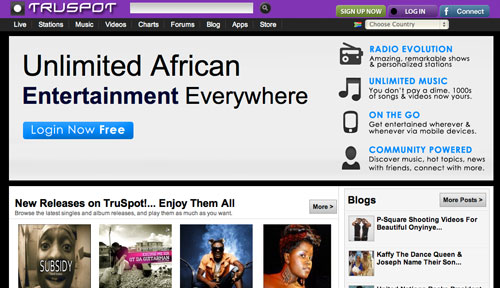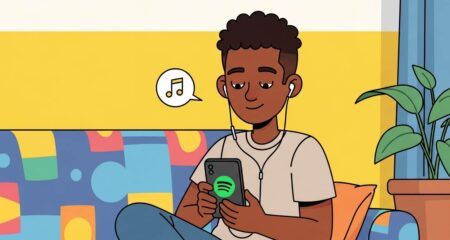
Ikenna “Ike” Orizu is the founder and CEO of TruSpot, a service he describes as the “Spotify for Africa”. Truspot, which offers Africa-specific content, is run out of Texas, but will move to its conceptual birthplace, Nigeria, later this month.
The groundwork for TruSpot came in the form of a podcast Orizu started five years ago, but only became the streaming and play-listing platform it is today late last year.
“I started the podcast in December 2006,” Orizu tells TechCentral. “Then it became live streaming radio shows in 2007 and 2008, and at the time it was a game changer in that there were no live shows for African music online then.”
Orizu had the idea for a podcast of African music and registered the domain after noticing Yahoo had a US$9 domain name sale. Orizu says it was the best investment of his life. He said the idea of venture capitalism and other investment was a foreign concept when he was starting the site at just 19.
“I didn’t know you could walk up to investors in Silicon Valley and get funding. I’ve been funding it myself from the start, and it’s only this year that I’m starting to get interest from potential investors,” he says. “I’m looking for investors now. I want African ones where possible, because I think they’ll understand the vision better.”
He says in 2010, TruSpot realised there was an audience for on-demand listening and built a site that could support streaming, customised playlist creation and pay-for downloads.
Orizu says TruSpot has 89 000 active users a month — or “addicts”, as he calls users who use the service for more than an hour a day on average. There are also more than 35 000 subscribers to the site’s various radio stations. “We’re hoping to double the subscriber figure within the next month.”
At launch, TruSpot focused only on Nigerian music, but Orizu says shortly thereafter “the dream got bigger” and the company decided to look at Africa as a whole. “It was hard to find Nigerian music online, and the same problem existed for the rest of Africa,” he explains.
Ghana and Uganda followed shortly thereafter, and Orizu now wants to take the service to every African nation he can. “Last month, we got an SA representative to work with local record labels,” he says. “We’re working on the SA landing page and hope to launch it properly next month.”
He says the service has a strong presence in Uganda, Nigeria and Ghana and is in the top 500 most popular websites in each of those markets. Eventually, he hopes to have a custom landing page and service offering for every African nation.
For now, the service’s revenue comes from advertising and the small percentage the site takes from each paid download in the store. TruSpot had been conceived as a free service but Orizu says that once the site reached about 2 000 tracks he realised he needed to monetise if it was to achieve its aim of “not sounding like traditional radio and not having invasive advertising”.
“We want the right sort of ads, too,” he says. “We want to advertise events, new releases and other things related to what our users love. We call it the ‘Social Tru model’ — if you’re a gospel listener, ads should be about Christian music and related topics.”
He says the site started generating revenue only last year and he has been on a drive to sign as many deals as possible with record labels to increase TruSpot’s catalogue of material to stream and sell, whether as single tracks or albums.
Orizu says one of the site’s greatest assets is its mobile Web application. It’s only available for BlackBerry devices for now but the company is working on Android and iOS apps, too.
The greatest challenge facing the service is the lack of bandwidth in Africa. To cope with this, the service dynamically adjusts the rate at which content is streamed, depending on speed of the user’s connection. At highest quality, TruSpot offers 256kbit/s streaming audio, and between 96kbit/s and 128kbit/s on the low end.
“The music is African, but we say we offer music and entertainment by Africans,” says Orizu. He says the site includes US and European music, too, because much of it is African-influenced.
Surprisingly, only 50% of TruSpot’s traffic comes from the African continent. London is the city that drives the most visits and the service enjoys sizeable amounts of its traffic from the US, followed by Ghana, Nigeria, Uganda and then India. “The goal is to get African music to the world.”
Less surprising is the fact that 90% of African users of the service access it via mobile phones. “The mobile industry is booming, and that’s why developing more apps is so important to us.”
At the moment, the only method of payment for downloads is PayPal. Orizu says this is because it is so widely accepted and helps allay concerns about fraud. “We’re now looking at an integrated system with PayPal to support credit cards.”
Orizu says that regardless of the country, the record labels have been supportive of the service. “The store is almost breaking even from the small percentage we take, but the rest goes as royalties to the artists,” he says.
“We want to grow the catalogue to hundreds of thousands of tracks from the 20 000 or so we have now and we won’t be satisfied until we have proper coverage of African content. We wants to make sure Africans — and people in the rest of the world — look up to African music. There’s no reason they shouldn’t.” — Craig Wilson, TechCentral
- Subscribe to our free daily newsletter
- Follow us on Twitter or on Google+ or on Facebook
- Visit our sister website, SportsCentral (still in beta)




